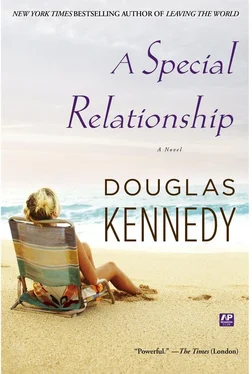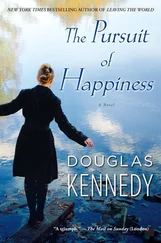'Sally... are you all right?'
I took a deep breath, and wiped my eyes. 'Just a bad morning, that's all'.
'Can I help?'
I shook my head.
'I'll be okay. But thank you'.
I stood up to leave.
'Cup of tea?'
'Please'.
She led me into her house, and down a corridor to her kitchen. She put the kettle on. I asked for a glass of water. I saw her watching me as I pulled my bottle of anti-depressants out of my jacket pocket, removed a pill, and washed it down with the water. She said nothing. She didn't try to make conversation. She just made the tea. And arranged cups and saucers, and milk and sugar, and a plate of biscuits. She poured me a cup and said, 'I don't want to pry, but... has something happened?'
'Yes - something's happened'.
Pause.
'If you want to talk about it...'
I shook my head.
'Fine', she said. 'Milk? Sugar?'
'Both, please'.
She poured in a dash of milk and one sugar. She handed me the cup. I stirred it. I put my spoon down. I said, 'They took my son away from me seven weeks ago'.
She looked at me with care. And then I told her everything. She said nothing. She just sat there and listened. When I finished, the tea was cold. There was a long silence. Then Julia asked, 'Are you going to let them get away with it?'
'I don't know what to do next'.
She thought about this for a moment, then said, 'Well, let's find you someone who does know what to do next'.
Eleven
FROM THE MOMENT I walked into his office, I didn't like the look of Nigel Clapp. Not that he appeared strange or threatening or abnormal. Actually, what first struck me about him was his absolute ordinariness - the sort of guy you would pass on the street and never register. He came across as a truly grey man who seemed like he was born at the age of forty, and had spent his entire life cultivating a grey functionary look, right down to the cheap grey suit he was wearing over a polyester white shirt and a grubby maroon knit tie.
I could have handled the bad clothes, the sallow countenance, the thinning black hair, the light sleety accumulations of dandruff on both shoulders, and the way he never seemed to be looking at you while talking. 'Don't judge a book by its cover', as my wonderful mom (who had a thing about needlepoint mottos) used to say.
No, what really bothered me about Nigel Clapp was his handshake. It was virtually non-existent - a brief placement of four damp, limp fingers into your right palm. It not only made you feel like you'd been given a dead mullet, but also that the purveyor of this hand had no personality whatsoever.
This perception was exacerbated by his voice. Low, monotonic, with a slightly hesitant cadence. It was the sort of voice that almost forced me to cup my ear to discern what he was saying. Coupled with the permanently stunned expression on his face (one which made him look like he'd just tumbled into an empty elevator shaft), he certainly didn't inspire confidence.
Which was something of a worry - considering that Nigel Clapp was my new solicitor, and my one hope of ever getting my son back.
Why did I end up with Nigel Clapp? Once again, I must recite another of my mother's preferred platitudes:
'Beggars can't be choosers'.
Actually, the way I found myself in the offices of Nigel Clapp was courtesy of a process that started in Julia Frank's kitchen. After hearing my story, she called a friend who worked as a deputy editor at the Guardian, handling (among other duties) a couple of weekly Law pages, which often dealt with family law cases. She outlined my situation, mentioning that I was married to a well-known journalist, but then playing coy about his name. The deputy editor told her that, as I had no income at present, I should qualify for Legal Aid - and gave her the number of a barrister named Jane Arnold, who specialized in family law cases. Julia called Jane. Who put her in touch with a friend named Rose Truman who happened to be an information officer at the Law Society (the registrar of all solicitors and barristers in England). Rose Truman in turn promised to post me out today a list of solicitors in my area who handled legal aid.
The speed at which Julia negotiated all this was dazzling. It also made me realize how little I understood about the way things worked here.
'Well, that's sorted then', she said, 'though I know my friend at the Guardian would love me to drop the name of your husband to her'.
'I don't want to spread gossip about Tony. I just want my son back. Anyway, as I told you, he's no longer at the Chronicle. He's a full-time father who's also probably trying to finish his novel'.
'And the smart bastard found a wealthy patroness to subsidize his literary endeavours. I'd put serious money on your little boy being part of the Faustian Pact they made'.
I stared into my teacup. 'That thought had crossed my mind, yes'.
'You know what I also think?' she said.
'What?' I said, looking up.
'I think you need a very large drink'.
'So do I. But I'm on these pills...'
'Are they anti-depressants?'
'Well... yes'.
'What kind?'
I told her.
'Then a large vodka won't kill you'.
'How do you know that?'
'Because I was on them during my divorce... and also because my sister's a chemist. And she gave me the all-clear for a shot of Absolut every so often. You do like vodka, I hope?'
'Yes, that would be very welcome indeed'.
She opened the freezer compartment of her fridge, retrieved the bottle of vodka, then found two glasses and poured out two small shots.
'You sure about this?' I asked.
'It never did me any harm. But, then again, I am from Glasgow'.
'You don't sound Scottish'.
'Glaswegian parents. Spent my first seven years there, then my father brought us south. Never went back - which probably means I'm completely deracinated'.
We clinked glasses. I took a tiny sip, I had forgotten how anaesthetizing frozen vodka can be. I allowed the liquid to loll about my mouth for a few moments, before letting it delightfully burn the back of my throat. After it slipped down, I let out a little sigh.
'Do I take that as a sign of approval?' Julia asked.
'You have good taste in vodka'.
'It makes up for the bad taste in men', she said, lighting up a cigarette. 'You don't mind if I indulge my filthy habit?'
'It's your house'.
'Good answer. You can stay'.
She downed her vodka and poured herself another small finger.
'May I ask you a direct question?' I said.
'Try me'.
'Did you like anti-depressants?'
'Enormously And you?'
'I'd recommend them to anyone having their child taken away from them...'
I shook my head, took another small sip of the vodka, and said, 'Sorry, that was crude'.
'But accurate'.
'How long were you on them for?'
'Nearly a year'.
'Good God'.
'Don't worry. It's not impossible to kick, especially if you're taken off them slowly. But, I must say, anytime these days that I find myself fighting off the black dog, I do think fondly back to my extended anti-depressant interlude'.
'What do you use instead nowadays?'
'Marlboro Lights and Absolut - neither of which really have the same efficacy as anti-depressants when it comes to dealing with what you're going through, which makes my ghastly divorce seem like a paper cut'.
'Paper cuts can be painful. Was your divorce really ghastly?'
'Anyone who says that they had an amiable divorce is a liar. But yes, it wasn't a pleasant experience'.
'Had you been married long?'
'Nine years. And though it went through the usual ups-and-downs during that time, I was just a little surprised when Jeffrey announced he was moving in with this French cutie he'd been seeing on the sly. I think that's the worst thing about discovering a long-term infidelity - being made to feel like such a slow-witted fool'.
Читать дальше












